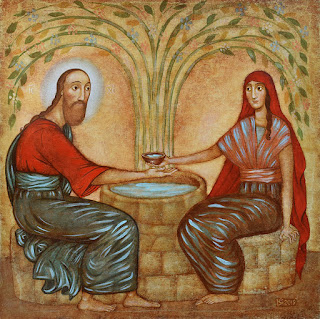4th Johnstide
July 19, 2020
Matthew 11:2-15
When John heard in prison about the deeds of
Christ, he sent his disciples to ask
him, “Are you the one who is to come, or
should we expect someone else?"
Cornelius Galle Younger, John Baptist in Prison
Jesus replied, “Go back and report to John what you hear and see: the blind receive sight, the lame walk, those who have leprosy are cleansed, the deaf hear, the dead are awakened, and those who have become poor receive the message of salvation. Blessed are those who are not offended by my Being.”
When they had gone, Jesus began to speak about John. “Why did you go out into the desert? Did you want to see a reed swaying in the wind? Or was it something else you wanted to see? Did you want to see a man in splendid garments? Those in splendid garments are in the palaces of kings. Did you go to see a man who is initiated into the mysteries of the spirit, a prophet? Yes, I say to you—he is more than a prophet. He it is of whom it is written:
Behold, I will send my angel before your face;He shall prepare the way of your working in human
hearts
So that your being may be revealed.
The truth I say to you: among all who are born of women, not one has risen up who is greater than John the Baptist, and yet the least in the kingdom of heaven is greater than he. From the days of John the Baptist, and even more, now, the kingdom of heaven will arise within human beings through the power of the will; those who exert themselves can freely grasp it. The deeds of the prophets and the content of the Law are words of the spirit that were valid [worked into the future] until the time of John. And if you want to accept it, he is Elijah who is to come. Whoever has ears to hear, let them hear.”
4th Johnstide
July 19, 2020
Matthew 11:2-15
A child may wish for a pony. If they receive a toy pony instead of a real one, there may be a disappointment. Yet in a child’s world of imagination, that toy pony may be able to take them on greater and broader adventures than any physical pony could.
The Hebrew people were expecting a certain kind of threefold
Messiah. He would be a great king who would overthrow the Roman occupation. He
would be a high priestly initiate. And he would be a great prophet. What they
got instead was a poor itinerant preacher and healer who would foretell his own execution. Even John the Baptist,
who had seen the Spirit of God descend upon him, became unsure if this was
truly the Messiah. And yet….
The reality of Christ in Jesus was far greater than their
hopes and expectations demanded. Jesus asks them to look to His deeds of
teaching and healing, for they are the beginning of the founding of a new human
race, a new people, the Christ folk. Instead of being an earthly king, he would
become the Lord of Karma. 
Melchizedek
Instead of serving as a priest in the temple in Jerusalem,
he would fulfill in his own person the sacrificial rites of bread and wine that
Melchizedek initiated. And he would give humanity the universal prayer that we
call the Lord’s prayer.
Instead of merely foretelling the future, he would become humankind’s future.
In our lives too,
often what we get from the Lord of Karma is far greater than what we wish for.
And thus, we may unite our souls, our thoughts, our feelings, our will, with
Christ and with whatever He wants to give us. It may not look anything like
what we expected or hoped for. In fact, it may appear to be something we most
decidedly did not want. But in His own secret way, Christ makes our lives
inexpressibly deeper and richer. Stephen Levine says:

Grunewald
that we shun as much as death,
it is the completion of our
birth.
It does not come in time,
but in timelessness
….
It is an insistent grace that
draws us
to the edge and beckons us
surrender
safe
territory and enter our enormity. *
* Stephen Levine, “Millennium Blessing” in
Breaking the Drought

















